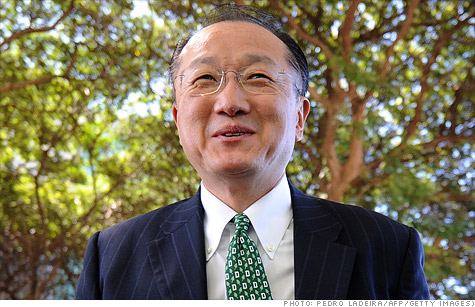Search News

Jim Yong Kim was born in South Korea and grew up in Muscatine, Iowa, after emigrating to the U.S. as a child.
NEW YORK (CNNMoney) -- American Jim Yong Kim was tapped Monday to be the next president of the World Bank, besting Nigerian finance minister Ngozi Okonjo-Iweala following the first-ever challenge to the U.S. nominee in the institution's history.
The bank's board of directors said the multiple candidacies "enriched the discussion of the role of the President and of the World Bank Group's future direction."
Kim's victory was widely expected, given the voting structure of the bank.
Throughout its more-than-60-year history, the bank has been led by an American, part of a tacit agreement between the United States and its Western European allies. Europe, in turn, has maintained control of the International Monetary Fund.
The United States and Europe together have roughly 50% of voting shares, which are based on money paid into the bank.
But the challenges from Okonjo-Iweala and former Colombian finance head Jose Antonio Ocampo -- who withdrew from the race last week and endorsed the Nigerian -- raised questions about how much longer the current leadership arrangement will remain tenable.
In 2010, the United States and other World Bank shareholder-countries pledged support for an "open, merit-based and transparent" selection process. Such declarations have been met with cynicism by emerging market nations, however.
In a statement last week withdrawing his candidacy, Ocampo said the selection process was "shifting from a strict merit-based competition ... into a more political-oriented exercise."
Kim drew criticism following his nomination from some observers who said his lack of financial background made him ill-suited to run the bank. The institution, created in 1944, provides billions of dollars worth of financial assistance for projects worldwide ranging from health to education to private-sector development.
In contrast to previous heads of the institution, who have typically come from the economics or business worlds, Kim is a doctor who built his reputation developing public health programs for poor countries.
He's currently the president of Dartmouth College, having previously worked at the World Health Organization and co-founded the non-profit organization Partners In Health.
Okonjo-Iweala, by contrast, is an economist with degrees from Harvard and MIT who logged more than two decades at the World Bank, eventually rising to the No. 2 position.
Earlier this month, a group of 39 former senior officials at the World Bank endorsed her in an open letter to the bank's board, saying the American monopoly on the presidency "no longer reflect[s] the world as it is today."
In an interview with CNN's Christiane Amanpour that will be broadcast at 5PM EDT, Okonjo-Iweala congratulated Kim and said she was pleased with what she had accomplished in her campaign.
"We've been able to push this process along, and we hope that going forward, we'll get an even more open, transparent and merit-based process," she said.
"It should not be about the nationality of individuals, but about merit."
Kim, who was born in South Korea before emigrating to the U.S. at age five, has won support from those who believe the bank should focus its energy on poverty reduction in the world's poorest countries.
"As President, I will seek a new alignment of the World Bank Group with a rapidly changing world," Kim said in a statement Monday, pledging to amplify "the voices of developing countries."
In announcing Kim's nomination last month, President Obama called the bank "one of the most powerful tools we have to reduce poverty and raise standards of living."
"It's time for a development professional to lead the world's largest development agency," Obama said.
The presidency became available when Robert Zoellick, a former deputy secretary of state who also served as international vice chairman at Goldman Sachs (GS, Fortune 500), announced that he would depart when his term concludes in June.
Going forward, it appears the world's emerging economies intend to make competition for the top jobs at the bank and the IMF a regular occurrence.
Following the resignation of IMF managing director Dominique Strauss-Kahn last year, the so-called BRICS countries -- Brazil, Russia, India, China and South Africa -- issued a joint statement calling Europe's leadership of the institution an "obsolete, unwritten convention." Mexican central bank chief Agustin Carstens challenged for the job, but another French leader, Christine Lagarde, ultimately succeeded Strauss-Kahn. ![]()
| Overnight Avg Rate | Latest | Change | Last Week |
|---|---|---|---|
| 30 yr fixed | 3.80% | 3.88% | |
| 15 yr fixed | 3.20% | 3.23% | |
| 5/1 ARM | 3.84% | 3.88% | |
| 30 yr refi | 3.82% | 3.93% | |
| 15 yr refi | 3.20% | 3.23% |
Today's featured rates:
| Latest Report | Next Update |
|---|---|
| Home prices | Aug 28 |
| Consumer confidence | Aug 28 |
| GDP | Aug 29 |
| Manufacturing (ISM) | Sept 4 |
| Jobs | Sept 7 |
| Inflation (CPI) | Sept 14 |
| Retail sales | Sept 14 |